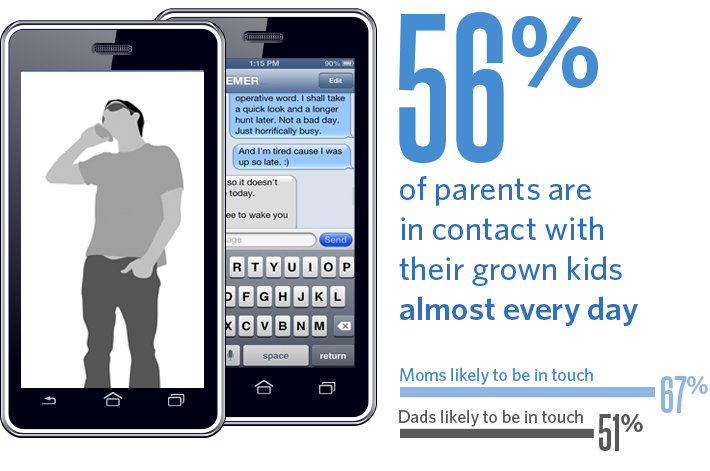
Parents once had to beg their grown children to keep in touch. Today, not so much. Emerging adults (18- to 29-year-olds) are in daily or near-daily contact with their grown children, according to the 2013 Clark University Poll of Parents of Emerging Adults. Texting is common, the poll finds, but the old-fashioned phone call is still the most popular way the two groups stay in touch. “The kids generally prefer texting, but they go along with their parents’ desire for a chat on the phone,” says Jeffrey Jensen Arnett, the Clark University Research Professor of Psychology who directed the poll [www.clarku.edu/clarkpoll/]. “For parents, texting is fine for brief updates, but they like to be able to hear their kids’ voices as well. The phone allows for a more in-depth conversation.” More findings from the Clark University Poll of Parents of Emerging Adults:
- 56% of parents say they are in contact with their grown kids “every day or almost every day.”
- The younger the child, the more often parents are in contact with them “every day or almost every day.” But 50% report daily contact even with their 26- to 29-year-olds.
- Moms (67%) are more likely than dads (51%) to be in contact with their kids “every day or almost every day.”
“Most emerging adults have not yet found their ‘soul mate’ and, while they are still looking for a life partner, they rely on the connection to their parents as a source of support and nurturance,” Arnett says. In fact, four out of five parents say their 18- to 29-year-old children rely on them for emotional support at least occasionally. Today’s emerging adults are often called “digital natives,” having grown up with personal computers, mobile phones, Facebook, and iPods. Their parents, in contrast, are “digital immigrants” who are not quite as comfortable with many technologies.
- Parents generally prefer the phone (73%) over texting (19%).
- Emerging adults say they prefer to text (45%), but still opt to speak with their parents by phone (48%).
- Email, social networks (such as Facebook), and video calling (such as Skype), are favored by only a small percentage of both parents and emerging adults.
The 2013 Clark University Poll of Parents of Emerging Adults and the 2012 Clark University Poll of Emerging Adults were developed by Arnett, who coined the term “emerging adulthood.” He recently co-authored (with Elisabeth Fishel) “When Will My Grown-Up Kid Grow Up: Loving and Understanding Your Emerging Adult” (Workman; May 2013). The book offers insights into how parents and their emerging adult children can navigate this stage in their relationship/development. Founded in 1887 in Worcester, MA, Clark University (www.clarku.edu) is a small, liberal arts-based research university addressing social and human imperatives on a global scale.


